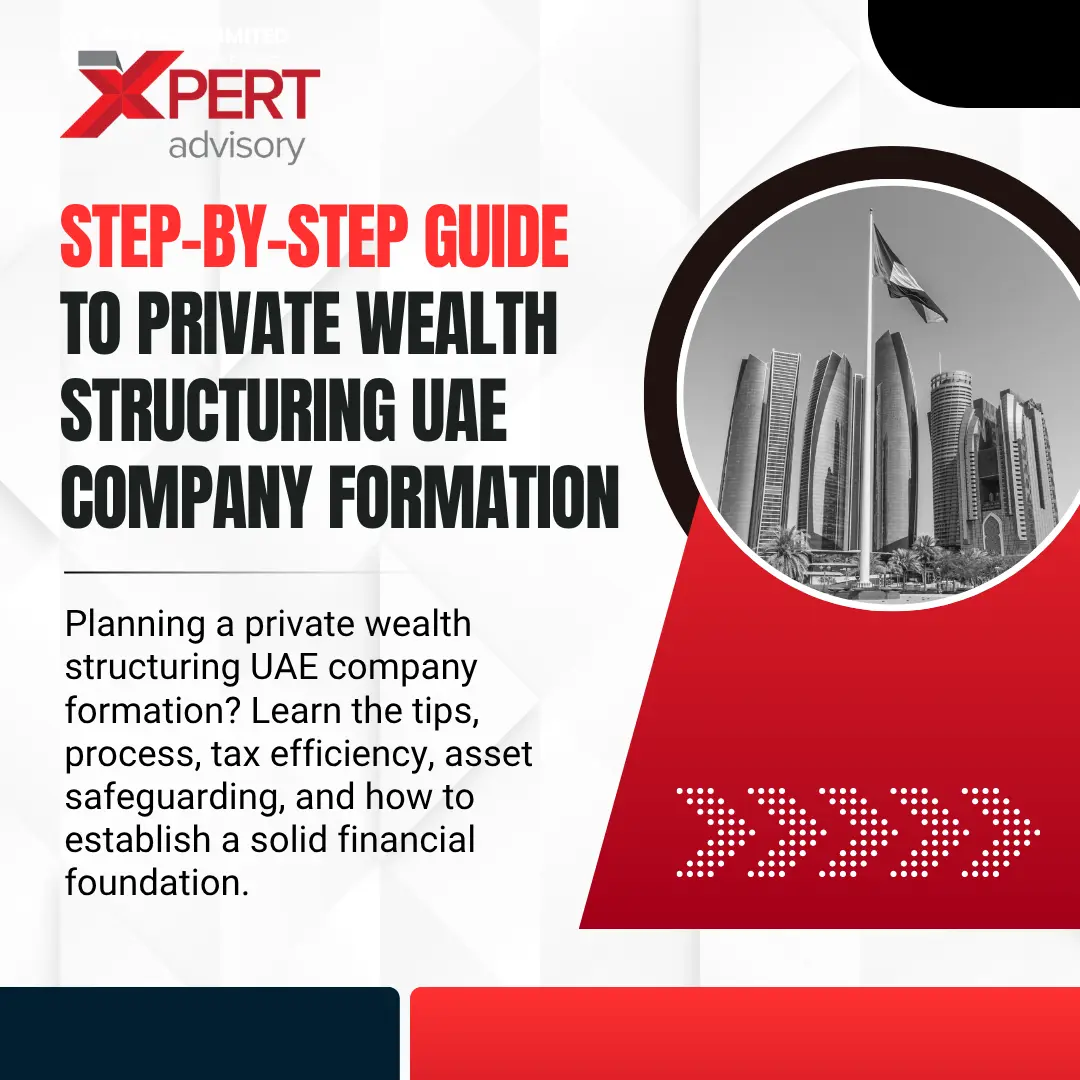For all high-net-worth individuals (HNWIs), family offices, and foreign investors, the UAE has become a global hun for wealth structuring and establishing businesses. The surge is due to the country’s strategic location, efficient tax system, excellent legal frameworks, and investor-friendly business environment. It also offers incredible opportunities for asset protection, succession planning, and wealth structuring.
This is why we have provided the essential steps for private wealth structuring UAE company formation. Let’s begin –
Understanding Private Wealth Structuring in the UAE

In the United Arab Emirates, private wealth structuring generally entails establishing frameworks or legal entities that protect assets, minimize taxes, and enable easy inheritance transfers. The two potent cars that are frequently utilized are:
- Family Foundations: Family business or foundations are non-shareholder legal organizations created to hold and administer assets for beneficiaries in accordance with the founder’s desires. Foundations are widely used in financial free zones such as the Abu Dhabi Global Market (ADGM) and Dubai International Financial Centre (DIFC) family because they offer robust succession planning and asset protection in a secure and transparent environment.
- Holding Companies: It’s for corporate companies in the UAE that own shares of other companies, and helps them consolidate assets for their operational and tax efficiency while also limiting liability.
These structures are useful in helping expats of foreign investors separate their private wealth from business risks while avoiding probate. Also, they can protect their wealth from creditors and leverage the incredible tax-friendly system within the UAE.
Why Should You Opt For Private Wealth Structuring In UAE?
Here are some popular reasons why one should choose private wealth structuring UAE company formation –
Zero Income Tax and Minimal Corporate Tax: The UAE provides a tax-friendly base for corporations and people. Also, there is zero personal income tax, offering an incredible business-friendly environment.
Asset Separation And Protection: Organizations such as family foundations legally divide private assets, shielding them from claims or creditors. With this, investors and family businesses can gain great benefits.
Planning For Succession And Inheritance: Foundations and holding businesses facilitate a smooth transfer of wealth with little interference from the law or probate. With a simple company incorporation, this is possible.
Flexible Legal Frameworks: The Common law regulatory framework is perfect for complex and cross-border wealth arrangements in free zones like the DIFC and ADGM. The legal and regulatory laws and regulations are very flexible and inclusive for business owners.
Confidentiality and Privacy: A lot of UAE structures provide a high level of confidentiality, which restricts the public disclosure of asset ownership. This is a major factor in making the UAE a global business hub for business owners.
Steps For Private Wealth Structuring UAE Company Formation

Step 1: Define Wealth Structuring Objectives and Scope
It’s important to first structure your own objective and scope. Common objectives include:
- Protection of assets from lawsuits or creditor threats
- Tax efficiency under the personal and corporate tax laws of the United Arab Emirates
- Planning for inheritance and succession to benefit future generations
- Combining and overseeing a variety of assets (IP, investments, and real estate)
- Ownership, privacy, and confidentiality
When planning to establish your company, it’s best to work with UAE legal and financial advisors who can tailor your approach depending on the jurisdiction. Also, it helps to cater to your specific asset portfolio.
Step 2: Choose the Appropriate Jurisdiction and Legal Structure
The UAE offers several jurisdictions for corporate structuring practice for your wealth:
Mainland UAE: Mainland zones are ideal for all operational companies, but less common for private wealth due to foreign ownership restrictions.
Free Zones (e.g., DIFC, ADGM, DMCC):UAE Free zones in the UAE are known to offer 100% foreign ownership and intricate legal frameworks that align with the Common Law. It is ideal for family foundations and asset management firms.
Offshore: Jurisdictions like Ras Al Khaimah International Corporate Centre (RAK ICC) are known to offer confidentiality and simplified administration. These are used mainly for tax optimization.
Also, it’s important to set up a business by choosing a particular company structure. Some legal structures to consider:
Family Foundation: Family foundations are used to hold assets under council governance but without shareholders. They offer benefits for succession planning, more control, and protection.
LLC: Limited Liability Companies (LLCs) are frequently used for businesses with clear ownership stakes.
Free Zone Companies: Provide access to UAE markets for wealth management activities, 100% ownership, and streamlined licensing. It also offers several tax benefits.
Trust and Special Purpose Vehicles: For intricate estate and tax planning, ADGM and DIFC offer trusts and special purpose vehicles (SPVs).
Step 3: Identify and Register Business Activities
Determine the commercial activities your structure will partake in in accordance with your requirements for asset protection and wealth management. Typical tasks include investment advising and asset management.
- Property ownership and administration, including intellectual property rights
- Services provided by family offices and succession planning
- Corporate and financial consulting
In accordance with their regulations, register the activities with the appropriate licensing body (such as the Department of Economic Development, ADGM Registration Authority, or DIFC Authority).
Step 4: Reserve the Trade Name and Apply for Registration
Next is selecting a trade name that adheres to the UAE regulations. The company must not have a name that hurts the sentiments of UAE citizens. It should reflect solely your business activity. Also, you have to submit your name approval to the particular authority.
Once approved, prepare and submit the company formation documents, which typically include:
- Application form
- Passport copies of founders and directors
- Proof of address
- Business plan or description of business activities
- Memorandum and Articles of Association or Foundation Charter and Bylaws
Note that different jurisdictions have different requirements. For example, DIFC foundations may require a Charter and Bylaws governing assets and distribution.
Step 5: Obtain the Required Licenses and Approvals
Depending on the chosen jurisdiction and activity, obtain the relevant license for your company or foundation. Wealth structuring entities might require:
- Asset management licenses (regulated by the Dubai Financial Services Authority in DIFC)
- Holding company licenses in free zones
- Family foundation certificates and registration
Some jurisdictions offer fast-track licensing options, but be prepared for regulatory scrutiny, especially for financial or investment activities.
Step 6: Open a Corporate Bank Account
Next, it is advisable to open a corporate bank account. This will help you manage transactions and link your assets to your structure. Make sure you have provided all documentation, proof of beneficial owners, and comply with the Know Your Customer (KYC) system and Anti-Money Laundering (AML) requirements.
High-net-worth clients often use private banking services available in the UAE’s financial centers that complement private wealth structuring.
Step 7: Transfer and Settle Assets
Transfer ownership of assets, including shares, real estate, investment portfolios, and intellectual property, to your legal corporation or foundation when it is established. This procedure provides security and clarity in estate planning by legally separating assets from personal ownership.
Verify that asset transfers adhere to applicable rules. For instance, the UAE Land Department’s recognition of foundations that own real estate streamlines ownership transfers and lowers associated costs. Speak to a registered agent in case you are unaware of the changing rules and regulations.
Step 8: Establish Governance and Succession Mechanisms
For foundations, designate a board of directors or council to oversee assets and carry out your directives as specified in the bylaws and charter. Companies should choose directors and create shareholder agreements that specify succession and control.
Carefully consider succession arrangements to prevent potential disputes and delays in probate. In general, foundations offer more continuity without disruptions following the founder’s passing.
Step 9: Ensure Compliance and Ongoing Administration
Make sure you have complied with the reporting, auditing, and filing requirements. This mainly includes:
- Annual renewal of licenses and registrations
- Filing financial statements as required by the regulators
- Keeping your financial records up to date
- Updating all governance information
Conclusion
Structuring private wealth through UAE company formation is a strategic move for high-net-worth individuals and families seeking to protect, grow, and preserve their assets in a tax-efficient and legally secure manner. Private wealth structuring UAE company formation can only be possible when you choose the right jurisdiction, comply with the changing regulations, and provide all legal documentation correctly.
Engaging with professional advisors, understanding local regulations, and following a systematic step-by-step approach are keys to success in UAE private wealth structuring.
Planning a Private Wealth Structuring in UAE?
If yes, let Xpert Advisory ease the process for you! Our highly experienced and knowledgeable consultants and advisors in the UAE and GCC regions will guide you on the right jurisdiction, complete the paperwork, and ensure you comply with all legalities. Give us a call to learn more about how we can help!
FAQs
Can UAE Private Foundations Own International Assets Directly?
Yes, it is possible for private foundations and holding companies to own and manage UAE and international assets.
Does Forming a UAE Company or Foundation Give a Residency Visa Automatically?
No, it does not automatically provide a residency visa. There are separate procedures for obtaining a visa.
What Is The Impact On Private Wealth Structuring Of The UAE’s New Corporate Tax Regime?
Certain holding companies and foundations employed in private wealth structuring are exempt from taxes and have special provisions under the UAE’s corporate tax law.


